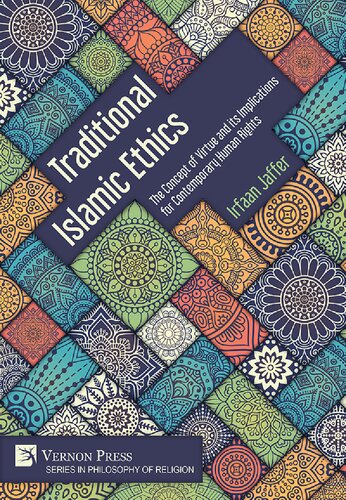

Most ebook files are in PDF format, so you can easily read them using various software such as Foxit Reader or directly on the Google Chrome browser.
Some ebook files are released by publishers in other formats such as .awz, .mobi, .epub, .fb2, etc. You may need to install specific software to read these formats on mobile/PC, such as Calibre.
Please read the tutorial at this link: https://ebookbell.com/faq
We offer FREE conversion to the popular formats you request; however, this may take some time. Therefore, right after payment, please email us, and we will try to provide the service as quickly as possible.
For some exceptional file formats or broken links (if any), please refrain from opening any disputes. Instead, email us first, and we will try to assist within a maximum of 6 hours.
EbookBell Team

4.1
100 reviews"Traditional Islamic Ethics: The Concept of Virtue and its Implications for Human Rights" concentrates on the subject of Islam and modernity and Islam and human rights, a topic that has become popular and relevant with the rise of globalization and the interest in Islamic extremism and human rights. This book distinguishes itself by operating within the framework of the traditional school of thought or 'Islamic Traditionalism'. In doing so, it draws on Islam's 1400-year-old spiritual and intellectual tradition and its understanding of ethics and virtue, along with truth, justice, freedom, and equality. This book argues that Islam's pre-modern approach is indispensable in creating an organic and integral human rights model for Muslims.
The first section argues that the current understanding and implementation of international human rights needs to be more flexible and inclusive if it truly aims to be universal in scope; this is because 'The Universal Declaration' and its offshoots are still underpinned by secular-liberal principles, and therefore, are at odds with other cultural traditions. To this end, this section critically explores popular human rights histories and contemporary ethical theories that attempt to justify human rights. The second section of this book provides a general overview on the subject of 'Islam and Human Rights'. After explaining some of the main problems, this section examines various solutions offered by Muslim academics and scholars, focusing on four different types of Muslim responses to modernity and human rights: liberal, progressive, traditional, and fundamentalist. It concludes that there are 'spaces of convergence' between modern-liberal ethics and traditional Islamic virtue ethics while maintaining that there are also fundamental differences and that these differences should be welcomed by human rights theorists and advocates.
The book's intended audience is primarily post-graduate students and professional academics in the fields of Human Rights, Ethical Philosophy, and Islamic Studies (modern Islamic thought, Sufism, Islamic theology, Islamic Philosophy, and Traditionalism). It will also appeal to anyone interested in the subject of Islam and modernity in general and Islam and human rights in particular.